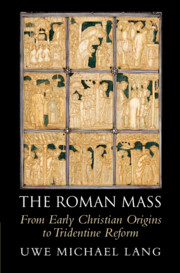Book contents
- The Roman Mass
- The Roman Mass
- Copyright page
- Contents
- Figures
- Acknowledgements
- Abbreviations
- Introduction
- 1 The Last Supper
- 2 The Eucharist in the Early Church
- 3 Development of Eucharistic Prayers in the Third and Fourth Century
- 4 The Formative Period of Latin Liturgy
- 5 Roman Stational Liturgy
- 6 The Expansion and Adaptation of the Roman Liturgy in the Carolingian Age
- 7 From the Ottonian Revival to the High Middle Ages
- 8 Decline and Vitality in the Later Middle Ages
- 9 The Tridentine Reform
- Epilogue
- Bibliography
- Index
2 - The Eucharist in the Early Church
Published online by Cambridge University Press: 08 September 2022
- The Roman Mass
- The Roman Mass
- Copyright page
- Contents
- Figures
- Acknowledgements
- Abbreviations
- Introduction
- 1 The Last Supper
- 2 The Eucharist in the Early Church
- 3 Development of Eucharistic Prayers in the Third and Fourth Century
- 4 The Formative Period of Latin Liturgy
- 5 Roman Stational Liturgy
- 6 The Expansion and Adaptation of the Roman Liturgy in the Carolingian Age
- 7 From the Ottonian Revival to the High Middle Ages
- 8 Decline and Vitality in the Later Middle Ages
- 9 The Tridentine Reform
- Epilogue
- Bibliography
- Index
Summary
In the twentieth century, some prominent German-speaking Catholic theologians, including Romano Guardini, Josef Andreas Jungmann, Joseph Ratzinger and Walter Kasper, engaged in a discussion on the ‘basic structure’ or ‘basic form’ (Grundgestalt) of the Mass. The backdrop to this theological debate was formed by the movements for liturgical renewal both before and after the Second Vatican Council.1 Responding to attempts to derive the Eucharistic liturgy from the Last Supper, Joseph Ratzinger formulated two key hypotheses: first, ‘the Last Supper is the foundation of the dogmatic content of the Christian Eucharist, not of its liturgical form. The latter does not yet exist’;2 second, the dominical command ‘Do this in remembrance of me’ (1 Cor 11: 24, 25; Luke 22:19) ‘does not refer to the Last Supper as a whole … but to the specifically eucharistic action’.3 I consider these two insights crucial for investigating the nascent liturgical forms of the Eucharist.
- Type
- Chapter
- Information
- The Roman MassFrom Early Christian Origins to Tridentine Reform, pp. 37 - 77Publisher: Cambridge University PressPrint publication year: 2022

